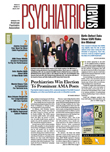Medicare Part D beneficiaries with mental illness continued to have difficulty obtaining needed medications throughout the first full year of the program, according to recently released data.
Patients with psychiatric illness who are dually eligible for the Medicaid and Medicare programs experienced serious barriers throughout 2006 as they moved from the Medicaid program to the Medicare part D prescription drug program. The findings, from an as-yet-unpublished study by the American Psychiatric Institute for Research and Education (APIRE), expanded on data documenting access problems in the first four months of the transition. That APIRE study assessed Part D access until May 2006 and was published in the May American Journal of Psychiatry.
The latest APIRE report, presented in part during APA's annual meeting in May, concluded that access shortcomings identified in the first four months of the Part D transition continued throughout the first year and in some cases worsened as the year went on.
“It was shocking that the rates of medication access problems continued,” said Joyce West, Ph.D., director of the APA Practice Research Network and one of the study's authors.
The study was the first to compile clinically detailed, national data on the impact of drug-plan management practices under Medicare Part D on dual-eligible psychiatric patients' medication access, compliance, and clinical outcomes.
The survey of 1,183 psychiatrists in the first eight months of the year and another 1,600 in the last four months reported clinically detailed information on one systematically selected dual-eligible Part D patient under each psychiatrist's care. Each psychiatrist reviewed a six-week time period to identify if there was a medication-access problem.
The researchers randomly selected 5,833 psychiatrists from the AMA's physician master file of all U.S. psychiatrists, and 1,183 of those responded and met the study criteria.
The study found that 46 percent of patients had problems filling their prescriptions in the last four months of 2006, up from 40 percent reported in the first four months of 2006. The number of psychiatrists who reported changing or discontinuing their patients' clinically indicated medications rather than pursuing appeals or exceptions rose to 25 percent from 19 percent in the first four months of the program. The number of psychiatrists who had to ask drug plans for exemptions to their rules for patients in need rose to 36 percent from 27 percent in the first four months of the year.
Refills Were Serious Problem
Other access problems that appeared to worsen included difficulty accessing medication refills, which rose from 30.6 percent in the first four months to 43 percent in the later months. Patients who were stable taking clinically indicated and desired medications but were required toswitch to a different medication because clinically preferred medication refills were not covered or approved rose from 18.3 percent to 28 percent.
The study further found the number of patients who discontinued or temporarily stoppedtaking medication because of prescription drug coverage limits or “management issues” rose from 22.3 percent to 29 percent.
One of the few areas of improvement appeared in a reduced amount of time psychiatrists reported devoting to Part D-related paperwork as a percentage of their overall patient care. That time share dropped from 45 percent in the first four months to 34 percent of overall patient care time in the last four months of the year.
“The time has gone down a bit but it is still considerable,” West said.
The study was funded by the American Psychiatric Foundation and a pharmaceutical industry coalition. APIRE maintained total control of the design, execution, and analysis of the study data.
Although the study results are limited by its observational design, West noted, there is a “strong relationship” between that approach and establishing a causal relationship.
The full-year study findings appear to show that the widespread access problems reported during the rollout of Part D continued for at least the first full year of the program. They add quantifiable data to anecdotal reports that drug plans failed to have transition policies in effect for the 6 million dual-eligible beneficiaries affected by the change. Two million dual-eligible beneficiaries have mental illness.
Government Officials Respond
West said that she met with Centers for Medicare and Medicaid Services (CMS) officials in charge of the Part D program and that they were particularly concerned about drug plans requiring patients to switch to similar but lower-cost drugs. Federal policy prohibits the insurance companies from mandating such changes.
The study authors also described data indicating that the access problems and the drug-plan policies linked to them appeared to occur “fairly consistently across all plans,” West said.
“This is not a case of a few bad apples,” she pointed out.
She noted that although most of Part D plans include features designed to improve care for patients with mental illness, they don't seem to be working as intended.
APIRE has provided all of the study data to APA's Department of Government Relations to discuss with members of Congress and federal health policy-makers. The data have featured prominently in discussions between APA and members of Congress on efforts to maintain the “protected status” of six drug classes in Part D—which means that drug plans are required to cover them—when some members of Congress discussed removing some of those protections earlier this year.
The authors have submitted their full-year study results for journal publication.

